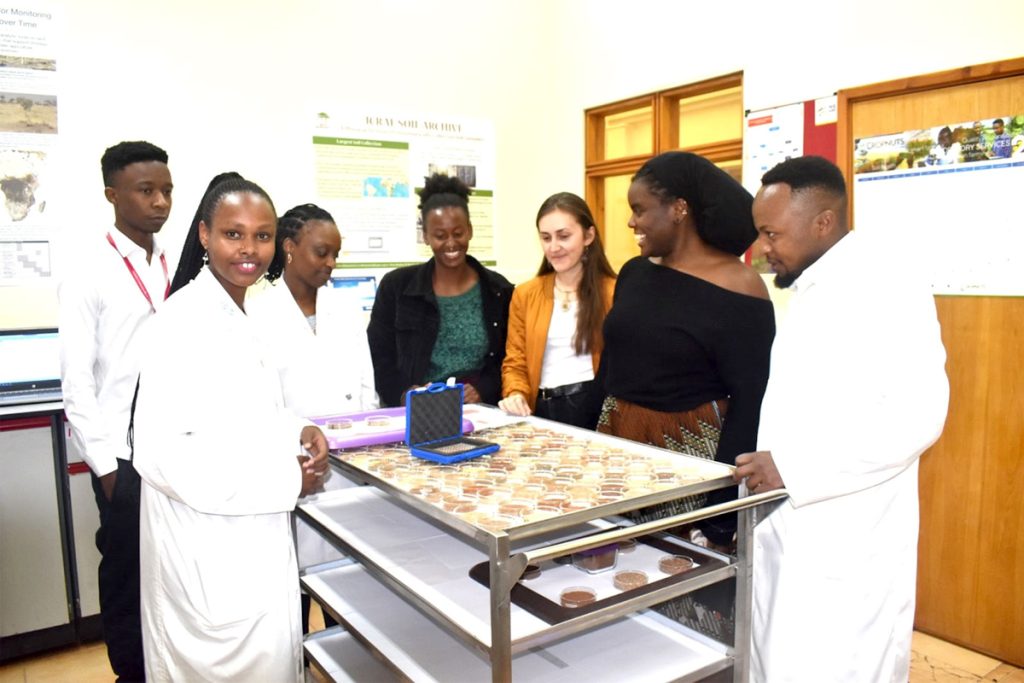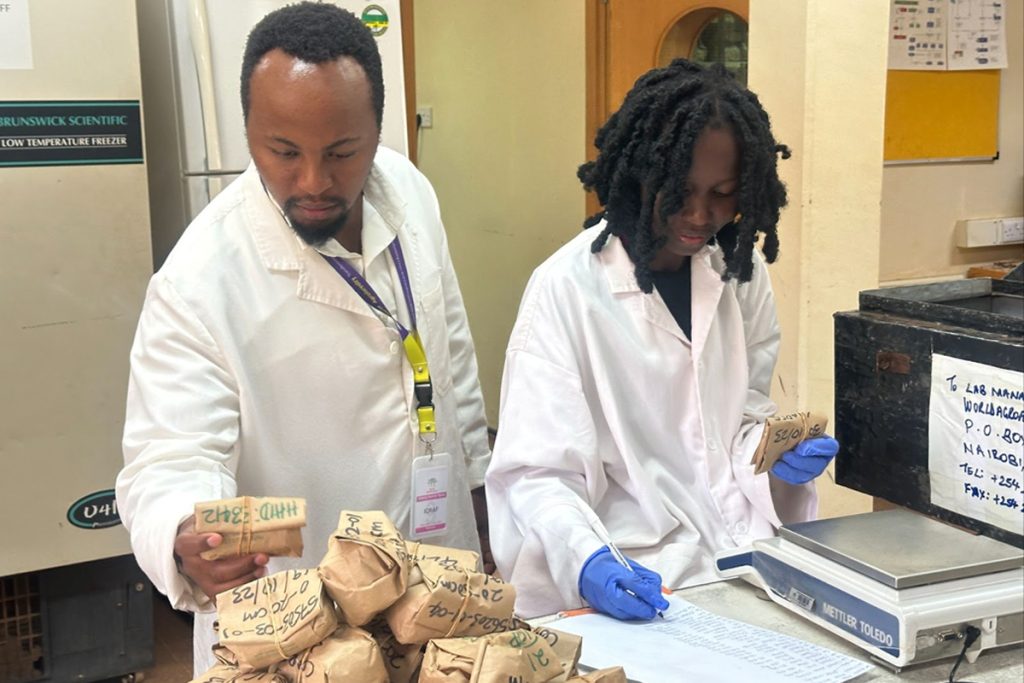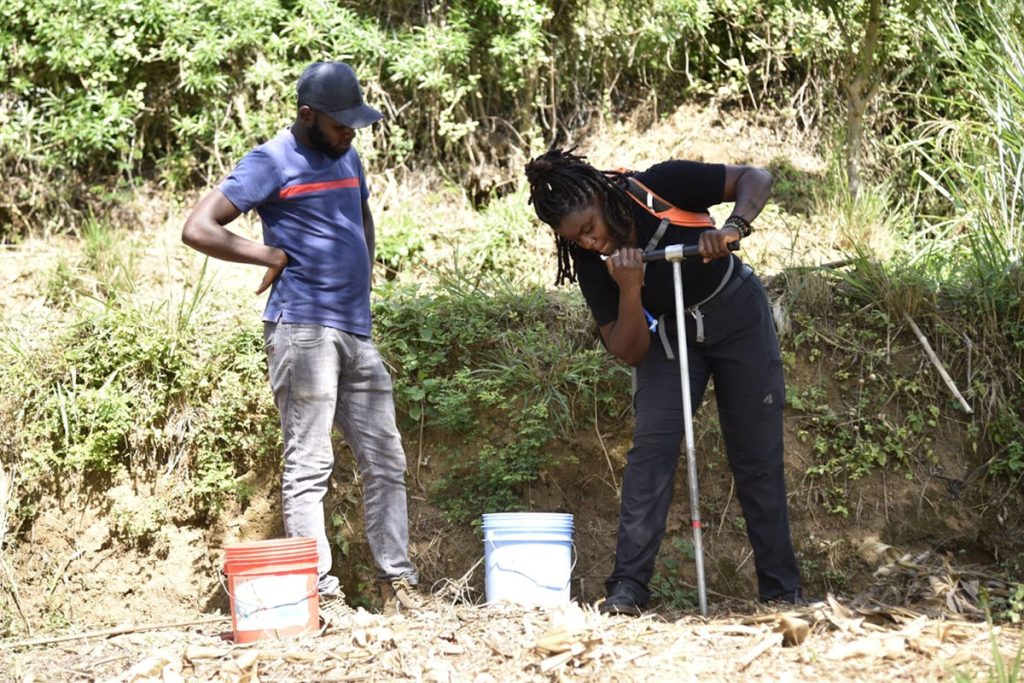
Decades of innovation and impact to share skills, train and mentor students and young scientists
On November 11, 2022, Leigh Ann Winowiecki, a systems scientist and leader of the soil and land health theme at the Center for International Forestry Research and the WorldAgroforestry (CIFOR-ICRAF), had just wrapped up a side event on soil health at the COP27 summit in Al-Sheikh. Her passion had been palpable, her words resonating with urgency and hope. As the event concluded, a young woman approached, making her way through the crowd. She introduced herself as Veronica Vasilica, a master’s student from the University of Bayreuth in Germany. She spoke earnestly, seeking mentorship and a chance to dive deeper into the field of soil health.
Six months later, Veronica found herself under the vast, open skies of Siaya County in Western Kenya. She had joined CIFOR-ICRAF Soil and Land Health for a three-month internship. Here, she would study how compost applications could change the physical, chemical and biological properties of agricultural soils—a key question for her MSc programme in Global Change Ecology..
Veronica was not alone in her journey. Over the past four years, CIFOR-ICRAF’s Soil and Land Health Laboratory has welcomed more than fifty interns—students from all over the world, united by their shared passion for soil science. In 2023, a record fourteen students walked through the doors of this global hub for soil research.
A hub of innovation and learning

The Soil and Land Health Laboratory has been a leader in transforming land and soil health assessments over the last two decades. As a global facility, it is renowned for its robust, cost-efficient, and rapid analysis of soils, plants, and agricultural inputs such as manure and fertilizers using dry spectral methods.
Beyond its technical achievements, the laboratory has scaled its spectroscopy technology globally through capacity-building initiatives and partnerships. Today, it is the key reference laboratory for more than twenty regional spectroscopy laboratories. It also plays a crucial role in the Global Soil Laboratory Network global spectral library initiative with the Food and Agriculture Organisation.
Yet, amid all this progress, CIFOR-ICRAF remains dedicated to nurturing young talents. “We’re here to support the ambitions of young scientists at an individual level,” says Dickens Ateku, CIFOR-ICRAF senior laboratory manager. “The laboratory allows them to practice modern analytical methods for soil health assessments and learn from scientists with different expertise.”
Hands-on experience and personal growth
Interns at the Soil and Land Health Laboratory are immersed in modern analytical methods for soil health assessment. From their first day, they learn standard processes such as soil sampling, processing, and data analysis, which familiarizes them with the basics of spectroscopy. Working closely with diverse scientists—from chemists and statisticians to agroecologists—provides the students with one-on-one mentorship, deepening their understanding of technical skills and real-world applications.

As they progress, each student receives tailored training and mentorship focusing on their academic background and specific areas of interest.
“We have had students doing a myriad of topics for their master’s and PhD studies ranging from salinity, biochar, compost and many others,” adds Ateku. “Here, they are exposed to cutting-edge technology, professional support and practical analysis of their samples.”
“I’ve gained a newfound appreciation for the spectra of soils and plants and how crucial this data is to help farmers across the globe,” reflects Joel Harawa, a data analyst intern and computer science student from New York University.
A two-way learning process
The internship programme benefits both the students and the laboratory. “We ask each student to highlight any gaps they may have noticed and recommend areas of improvement,” says Ateku. “This feedback ensures we are continually improving and developing innovations.”
For instance, Soliver Che Fusi, an environmental engineering PhD student from the University of California, Berkeley, worked on using mid- and near-infrared spectra for assessing biochar physicochemical properties—an area the laboratory had not previously explored. This collaboration allowed the lab to co-develop a new measurement method, opening new avenues in biochar and soil health research.
“CIFOR-ICRAF is a unique hub, hosting multiple research organizations,” shares Fusi. “As a young researcher, exposure to various projects on this campus has been invaluable in helping me better understand international development and my role in it. I’ve learned the importance of defining my place as a researcher and citizen within the global environment.”
Veronica’s fellowship, like those of her fellow interns, was transformative. “My time has been enriching”, she says. “I have gained important technical and soft skills and had the chance to experience a vibrant international working environment. I am grateful for all the support I received and the opportunity to work alongside such inspiring colleagues.”
Read more:


















